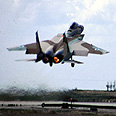
Israel targeted Iranian weapons in Syria - report
CNN says incident in which Israeli planes reportedly invaded Syrian airspace was actually an attack on Iranian weapons transferred to Syria; operation apparently included ground forces, report says
According to the report, the incident involved an aerial operation that also included ground forces that were meant to mark targets or inspect the damage caused by the attack.
It was also reported that the operation left "a great hole in the ground" in the Syrian desert. The report was based mainly on sources in the American government and CNN said that Israel was satisfied with the operation's results.
The report said Israel apparently targeted a type of weapon transferred through Syria to Hizbullah from Iran.
Sources told CNN reporter Christiana Amanpour that weapons have been transferred in this way for the past three or four years uninterruptedly.
AFP quoted an American official as saying, "It (attack) wasn't big. It was a quick strike. They were engaged by the Syrians, they dropped their ordnance and scooted out of there.
The official, according to AFP, did not know the target of the strike, but said the US military believed it was meant to send a message to the Syrians.
"The Israelis are trying to tell the Syrians: 'Don't support a resurgence of Hizbullah in Lebanon," he said.
'This is an unacceptable development'
Hours before CNN report was broadcast, Syria appealed to UN Secretary General Ban Ki-moon and the Security Council, and warned Israel of "the consequences of this outrageous aggression."
In the message sent to the United Nations, Syria said that "the continuing silence of the international community vis-à-vis Israel's illegal act will place the region as well as the peace and security of both countries in the face of uncontrollable tragedies".
The Syrian letter to the UN argued that Israel "is determined to choose aggression instead of peace and by doing so it reveals its true intentions that it tries to hide using fake claims of seeking peace in the region".
On Monday, Turkish Foreign Minister Ali Babacan demanded Israel explain the discovery of unmarked fuel tanks near Turkey's border with Syria.
"This is an unacceptable development," Babacan said in a joint news conference with his Syrian counterpart Walid al-Moallem, who was visiting Turkey.
"All countries in the region must show respect to all countries' sovereignty and carefully avoid acts that lead to tensions," Babacan said. "Otherwise, tensions would be fueled and peace and stability in the region might be harmed."










